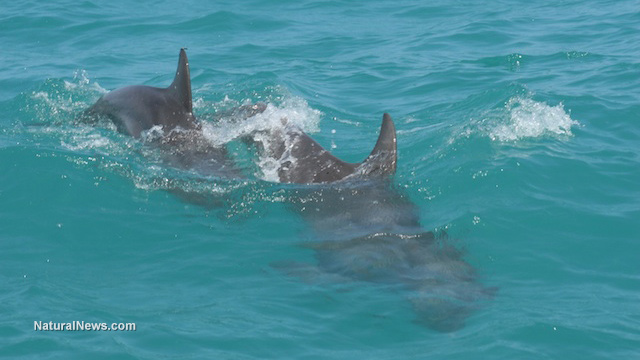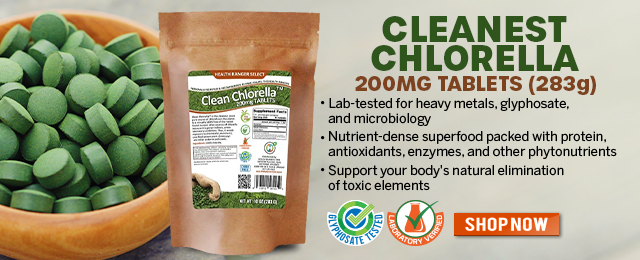Dolphin-safe food labeling declared illegal by globalist trade organization ... Here comes the global censorship of food labeling
Sunday, December 06, 2015 by: David Gutierrez, staff writer
Tags: Food labeling, tuna, trade agreements

(NaturalNews) On November 20, the World Trade Organization (WTO) declared that dolphin-safe labels on cans of tuna are a barrier to trade that place the U.S. in violation of its treaty obligations. The U.S. must stop offering "dolphin-safe" labels or face punitive sanctions from Mexico. Analysts expect the government to cave.
The case is a classic example of what globalization critics have warned of for years: that "free trade" agreements allow foreign corporations to force the repeal of laws that interfere with their profits, thereby gutting protections for consumers, workers and the environment. Observers warn that the soon-to-be implemented Trans-Pacific Partnership (TPP) contains the exact same provisions, and that more such forced repeals are soon to come.
Your right to know: a barrier to trade
The story of dolphin-safe tuna began in 1972, when the Marine Mammal Protection Act banned the importation of any yellowfin tuna caught using methods that resulted in the death of dolphins. In the preceding decades, millions of dolphins had been killed by tuna nets.In 1990, Mexico – on behalf of its domestic fishing industry, which continues to use dolphin-killing techniques – appealed to the WTO to strike down this ban. In 1997, Congress sought to resolve the issue by repealing the import ban and replacing it with a voluntary "dolphin-safe" label. This label could be placed on any tuna, regardless of fishing practices, if companies promised no dolphins had been killed. Tuna caught by killing dolphins could once more be openly sold, but without the label.
This concession was not enough. In 2008, Mexico filed another WTO complaint, claiming that the very existence of the dolphin-safe label discriminated against the Mexican fishing industry. In 2011, the WTO ruled in Mexico's favor. The U.S. has repeatedly weakened the dolphin-safe label in an attempt to strike a compromise.
The most recent ruling is final and can no longer be appealed: the label has to go, or Mexico can levy retribution against U.S. imports.
"Informing consumers of the fishing practices used to catch their tuna, the WTO concluded, represented a 'technical barrier to trade,'" writes David Dayen at The Intercept.
Worse to come
According to Tim Reif, general counsel at the U.S. Trade Representative's Office, the ruling does not actually require the U.S. to change its laws, as no international body can actually do that. But observers note that when threatened with trade sanctions, the U.S. consistently does change its laws. After all, the U.S. has already changed its dolphin-safe laws numerous times just in response to this single complaint.In another recent case, the WTO ruled in May that a U.S. law requiring country-of-origin labels on meat and produce posed a trade barrier, and Mexico and Canada threatened $3.7 billion in sanctions if the law was not repealed. The House of Representatives voted to repeal the law in June.
The dolphin-safe ruling takes on particular significance in light of the ongoing debate over the massive TPP trade deal being promoted by the Obama administration. The TPP contains the same language that allowed Mexico to file a WTO complaint over tuna. And while the White House claims that the TPP contains measures to protect wildlife, in fact the agreement contains only empty phrases binding members to "take measures" to combat wildlife trade.
The TPP has also been criticized for provisions expected to lead to strengthening Big Pharma patents at the expense of human health, limiting GMO labeling, outsourcing of more U.S. jobs, restricting Internet speech, weakening regulations of Wall Street, and promoting privatization of land and natural resources inhabited by indigenous people.
The case of dolphin-safe tuna "should serve as a warning against expansive trade deals like the Trans-Pacific Partnership that would replicate rules that undermine safeguards for wildlife, clean air, and clean water," said Ilana Solomon of the Sierra Club.
Sources for this article include:
EFF.org
StopTPP.org
TheIntercept.com
Food labeling at FETCH.news
Get independent news alerts on natural cures, food lab tests, cannabis medicine, science, robotics, drones, privacy and more.
Take Action: Support Natural News by linking to this article from your website
Permalink to this article:
Embed article link: (copy HTML code below):
Reprinting this article:
Non-commercial use OK, cite NaturalNews.com with clickable link.
Follow Natural News on Facebook, Twitter, Google Plus, and Pinterest
- Newly released JFK files reveal Pentagon's role in creating Lyme disease and covid in the same lab
- Trump nominates VACCINE ZEALOT Susan Monarez to lead the CDC, sidelining RFK Jr.'s reform efforts
- BEWARE: USDA allows genetically engineered vaccines to infiltrate organic food production
- Obama accused of laundering USAID funds to fuel global protest movements, regime change operations
- HUGE: Putin claims 2020 election fraud in U.S. sparked Ukraine war, calls for peace talks with Trump
- Chris Rufo finally reveals abuse liberals unleashed on his wife and young kids...
- Deep State in disarray: Trump's funding freeze sows chaos, Democrats vow legal battle
- Trump shows his true colors
- STARDUST, a secretive Israeli-US startup, plans risky solar geoengineering experiment to BLOCK OUT THE SUN
- $2B Roundup verdict: A landmark blow to Bayer and a win for health freedom
- Trump's greatest betrayal so far: Accelerating Middle East wars, silencing dissent, and serving Zionist masters
- Outrageous government fraud: $312M in COVID loans went to children as young as 9 months old
- Festive flavors: The sweet history, nutritional profile and health benefits of pecan pie
- “Behind the Green Mask”: Rosa Koire exposes the hidden agenda of UN Agenda 21
- SWEET SABOTAGE: CIA's secret war on Soviet sugar revealed in JFK files
- Dr. Mike Yeadon releases 15-minute testimony - WATCH - about genocidal intent of COVID “vaccines”
- “Forever chemicals” in drinking water drive alarming cancer surge, new study warns
- A mysterious startup is developing a new form of solar geoengineering
- Elon Musk: Aliens could be here on Earth RIGHT NOW
- EPA advisor admits the agency is funneling billions to climate groups ahead of Trump’s return to White House
- Trump reverses course on Gaza plan, says “nobody is expelling Palestinians”
- Reclaim your health: How midlife exercise reverses years of inactivity
- A lack of integrity in Academia: Harvard professor found GUILTY of fraudulent research to promote CRT theory
- Space war brewing? Russia threatens to destroy Starlink satellites
- Big Pharma's $8 Billion bribery scheme exposed: how doctors are pushed to prescribe junk science, not heal
- Mike Adams Sermon 66: God will DESTROY ISRAEL for its wickedness
- Rep. Nancy Mace introduces bill to ban biological males from female facilities on federal property
- Survival 101: Effective EMF blocking techniques
- 5 Simple steps to boost your brainpower: How to strengthen executive function in a distracted world
- Historian warns Israel may be entering an “IRREMEDIABLE DECLINE”
- Florida takes a stand: DeSantis proposes permanent ban on mRNA vaccine mandates
- RFK Jr.'s SSRI antidepressant investigation sparks liberal meltdown, exposes Big Pharma's dangerous game
- New York politicians push bill allowing governor to indefinitely detain the unvaccinated on a whim
- Sales of survival bunkers rise following Russia’s use of the Oreshnik hypersonic ballistic missile
- Pilots report mysterious lights 'moving at extreme speeds' across Oregon skies
- Newly released JFK files reveal Pentagon's role in creating Lyme disease and covid in the same lab
- EPA advisor admits the agency is funneling billions to climate groups ahead of Trump’s return to White House
- The Health Ranger releases “Vaccine Zombie” song and music video, using AI-animated zombies for the music video
- The pandemic as a tool for INDOCTRINATION: Understanding “The Indoctrinated Brain” by Dr. Michael Nehls
- California's social media censorship law struck down: A victory for free speech or a threat to online safety?
- Dr. Mike Yeadon releases 15-minute testimony - WATCH - about genocidal intent of COVID “vaccines”
- Congratulations to the FULLY UNVACCINATED as you resisted the COVID-19 PROPAGANDA MACHINE fueled by over $100 BILLION
- Mike Adams releases country western hit single: Goin’ Back in Time is Comin’ Home
- RFK Jr. clears key hurdle: Sen. Susan Collins backs controversial HHS nominee, signaling a new era for health policy
- Mike Adams releases music poetry sensation: A Child of God
- Mike Adams releases new song and music video: Nothing More Disgusting Than a Globalist
- Unpacking the Lies That We’ve Been Fed – new song and music video released by Mike Adams, the Health Ranger
- Trump administration takes on global censorship: A new frontier for free speech advocacy
- Florida takes a stand: DeSantis proposes permanent ban on mRNA vaccine mandates
- “Why we influenced the 2020 elections”: Facebook files reveal the coordinated effort to bury the Hunter Biden laptop story
- Ex-FBI Chief EXPOSES disgraceful government coverups of Oklahoma City Bombing, Kennedy assassinations, 9/11 WTC, and "Terrorism" as plot to destroy Constitution
- Michigan sheriff announces criminal investigation into 2020 election crimes, Dominion Voting Systems
- Israeli soldiers accused of even more torture and abuse in the West Bank
- Federal judge backs Trump's mass firings, clearing path for government downsizing
- Red Cross issues warning to stop blood plasma donations from vaccinated people
- Scientists confirm: GENIUS brain function can be spontaneously unleashed in humans without any apparent cause
- EPA advisor admits the agency is funneling billions to climate groups ahead of Trump’s return to White House
- HYSSOP: What research reveals about the health benefits of this ancient holy herb
- Two containers with completed ballots fall out of truck in Florida
- Fully vaccinated about to see “tsunami” of illness and death, warns virologist
- Today I asked our AI language model “Neo” about which phytonutrients or phytochemicals can block the spike protein related to SARS-CoV-2 … Here is what it answered…
- Global leaders unite to clamp down on “misinformation” with UN-backed Cascais Declaration
- BREAKING: 2025 NDAA authorizes mandatory military draft of WOMEN across America… as Pentagon pursues global NUCLEAR war with both Russia and China at the same time
- Michael Yon warns of a ZIONIST TAKEOVER in Trump’s second administration
- BOMBSHELL: DNA testing kits are a SCAM to develop ethnic-specific bioweapons
- Ozempic and Wegovy weight loss drugs are injectable LIZARD VENOM PEPTIDES that may unleash a devastating wave of organ failure… side effects align with symptoms of SNAKE BITES
- Israeli soldiers accused of even more torture and abuse in the West Bank
- These 13 countries just signed an agreement to engineer a global FAMINE by destroying food supply
- NASA admits that climate change occurs because of changes in Earth’s solar orbit, and NOT because of SUVs and fossil fuels
- RFK Jr. clears key hurdle: Sen. Susan Collins backs controversial HHS nominee, signaling a new era for health policy
- Sermon 30: How Jesus reveals Caesar’s FAKE CURRENCY and FALSE AUTHORITY
- Coriander seeds: Ancient medicine backed by modern science
Science News & Studies
Medicine News and Information
Food News & Studies
Health News & Studies
Herbs News & Information
Pollution News & Studies
Cancer News & Studies
Climate News & Studies
Survival News & Information
Gear News & Information
News covering technology, stocks, hackers, and more



"Big Tech and mainstream media are constantly trying to silence the independent voices that dare to bring you the truth about toxic food ingredients, dangerous medications and the failed, fraudulent science of the profit-driven medical establishment.
Email is one of the best ways to make sure you stay informed, without the censorship of the tech giants (Google, Apple, Facebook, Twitter, YouTube, etc.). Stay informed and you'll even likely learn information that may help save your own life."
–The Health Ranger, Mike Adams












































